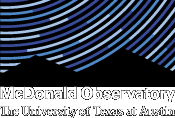FORT DAVIS, Texas — McDonald Observatory and its community partners (Big Bend National Park, Big Bend Ranch State Park, the Davis Mountains Preserve, and others) are close to sending in their application to create an International Dark Sky Reserve in the Big Bend, and need your help. The group is asking for letters of support to accompany their application to the International Dark Sky Association.
The proposed Big Bend International Dark Sky Reserve would be the largest of its kind in the world, at more than 10 million acres in West Texas and Northern Mexico.

